|
|
|
Sort Order |
|
|
|
Items / Page
|
|
|
|
|
|
|
| Srl | Item |
| 1 |
ID:
161526
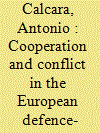

|
|
|
|
|
| Summary/Abstract |
Defence-industrial collaborative activities have gained a central stage in the current European debate, based on the simultaneous presence of two systemic pressures (unipolarity and “defence-industrial globalization”) that are pushing EU member states towards more cooperation in these issues. Nevertheless, the European defence-industrial panorama still continues to be characterized by both cooperation and conflict. Protectionism, oligopolistic market straining and primary resource to domestic suppliers have prevented a more structured defence-industrial cooperation.
|
|
|
|
|
|
|
|
|
|
|
|
|
|
|
|
| 2 |
ID:
161528
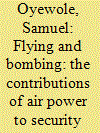

|
|
|
|
|
| Summary/Abstract |
There is a growing resort to air power in Nigeria’s military and security engagements in the oil producing region of Niger Delta. However, most literatures on security engagements in the region overlook air power, or reduce it to unnecessary flying and indiscriminate bombing of civilians. Air power plays a considerable role in surveillance and coercion against the menace of kidnapping, sabotage, oil theft and illegal oil refining, militancy, and armed robbery against ships in the Niger Delta and associated piracy off the coasts of Nigeria, its neighbours and the Gulf of Guinea. It is also involved in strategic transportation, search and rescue/relieve of endangered civilians (e.g. hostages) and to an extent victims of natural disasters (e.g. floods). This article seeks to examine the threats to security in Nigeria’s Niger Delta, and the relevance of air power in the arrangement of security responses and disaster management in the region.
|
|
|
|
|
|
|
|
|
|
|
|
|
|
|
|
| 3 |
ID:
161523
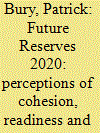

|
|
|
|
|
| Summary/Abstract |
The British Army Reserve, and in particular its logistics component, is currently undergoing profound organisational transformation as part of the Future Reserves 2020 (FR20) program. Yet, to date there has been no sustained quantitative analysis of perceptions of cohesion, readiness and morale in the Army Reserve. Moreover, there has been little quantitative examination of FR20’s impact to date. This paper addresses these gaps in the literature by undertaking an examination of the above variables using survey data from a representative sample of AR logistics soldiers collected longitudinally. It finds that cohesion is highly important in explaining variance in perceptions of readiness and morale, and that perceptions of cohesion, readiness and morale are relatively high in the force. Nevertheless, the data indicates that FR20 has failed to increase these significantly over time. Similarly, it finds that confidence in FR20 delivering increased military capability is also declining. These findings are important for understanding FR20’s impact to date and future trajectory.
|
| Contents |
The British Army Reserve, and in particular its logistics component, is currently undergoing profound organisational transformation as part of the Future Reserves 2020 (FR20) program. Yet, to date there has been no sustained quantitative analysis of perceptions of cohesion, readiness and morale in the Army Reserve. Moreover, there has been little quantitative examination of FR20’s impact to date. This paper addresses these gaps in the literature by undertaking an examination of the above variables using survey data from a representative sample of AR logistics soldiers collected longitudinally. It finds that cohesion is highly important in explaining variance in perceptions of readiness and morale, and that perceptions of cohesion, readiness and morale are relatively high in the force. Nevertheless, the data indicates that FR20 has failed to increase these significantly over time. Similarly, it finds that confidence in FR20 delivering increased military capability is also declining. These findings are important for understanding FR20’s impact to date and future trajectory.
|
|
|
|
|
|
|
|
|
|
|
|
|
|
|
|
| 4 |
ID:
161525


|
|
|
|
|
| Summary/Abstract |
This article contributes to an explanation of why Poland, after a period of almost two years’ hesitation, decided to dispatch military forces to the United States-led coalition against the Islamic State in June 2016. The Polish case is examined by applying the concept of strategic culture, taking into account a state’s core military strategic beliefs and the historical experiences on which these beliefs are based. The case study shows that strategic culture shaped the Polish decision-making on the coalition, by predisposing the decision-makers toward a typical Polish behavior in international military operations, namely to exchange security benefits with important allies. The article also has implications for the general study of strategic culture, by specifying the relationship between historical experiences and strategic culture.
|
|
|
|
|
|
|
|
|
|
|
|
|
|
|
|
| 5 |
ID:
161522
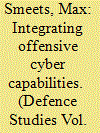

|
|
|
|
|
| Summary/Abstract |
Across the world, states are establishing military cyber commands or similar units to develop offensive cyber capabilities. One of the key dilemmas faced by these states is whether (and how) to integrate their intelligence and military capabilities to develop a meaningful offensive cyber capacity. This topic, however, has received little theoretical treatment. The purpose of this paper is therefore to address the following question: What are the benefits and risks of organizational integration of offensive cyber capabilities (OIOCC)? I argue that organizational integration may lead to three benefits: enhanced interaction efficiency of intelligence and military activities, better(and more diverse) knowledge transfer and reduced mission overlap. Yet, there are also several negative effects attached to OIOCC. It may lead to 'cyber mission creep' and an intensification of the cyber security dilemma. It could also result in arsenal cost ineffectiveness in the long run. Although the benefits of OIOCC are seen to outweighs the risks, failing to grasp the negative effects may lead to unnecessary cycles of provocation, with potentially disastrous consequences.
|
|
|
|
|
|
|
|
|
|
|
|
|
|
|
|
| 6 |
ID:
161527
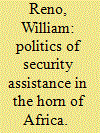

|
|
|
|
|
| Summary/Abstract |
This examination of international security assistance to Somalia points to the deficiencies of conventional security assistance strategies to partners in failed states and considers elements of an ad hoc alternative security assistance strategy. The social relationships among that state failure creates undermine the political will and capacity of recipients to utilize security assistance as providers intend. This consideration of developments in Somalia shows how domestic partners act in ways that frustrate efforts to build domestic security institutions. That record is manifest in persistent insurgent activities, even in Somalia’s capital city. The second part of this article explains how pragmatic efforts to fight Somalia’s Al-Shabaab insurgents create the outlines of an alternative security assistance strategy that bypasses elements of Somalia’s formal government structure and opts instead to rely on the creation of parallel security forces. While this strategy addresses a need to meet security objectives in the political environment of a failed state, it elevates tactical proficiency at the expense of strategic aims of conventional security assistance programs.
|
|
|
|
|
|
|
|
|
|
|
|
|
|
|
|
| 7 |
ID:
161524


|
|
|
|
|
| Summary/Abstract |
A reliable capability is essential for deterrence to succeed. While incredible threats coupled with an assured ability to hurt an adversary may be enough to alter behavior, even the most credible threat is left impotent in the absence of a sufficient capability. During the Cold War, the United States and Soviet Union at times sought weapons with first-strike potential that threatened the effectiveness of each other’s deterrent. Since then, though, nuclear powers have either committed to a no first use policy or generally refrained from pursuing technologies that could radically upset the strategic balance. Recent trends, however, again pose a threat to this stability. Nascent “left-of-launch” missile defense programs which rely on offensive cyber operations or electronic warfare to target adversary weapon systems prior to launch offer new opportunities for sophisticated state actors to subvert the reliability of these capabilities. This paper assesses what risks there may be to nuclear weapon delivery systems before examining why a country might be motivated to carry out such an act, what the ramifications for deterrence stability might be, and how these threats could be mitigated.
|
|
|
|
|
|
|
|
|
|
|
|
|
|
|
|
|
|
|
|
|